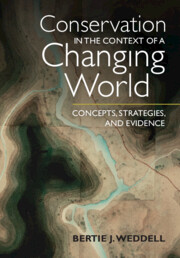Book contents
- Conservation in the Context of a Changing World
- Conservation in the Context of a Changing World
- Copyright page
- Dedication
- Contents
- Preface
- Acknowledgments
- Introduction
- Part I Maintaining Populations of Featured Species: A Utilitarian Approach to Conservation
- 1 Historical Context
- 2 Central Concepts
- 3 Strategies
- 4 Strategies
- Part II Protecting and Restoring Populations and Habitats: A Preservationist Approach to Conservation
- Part III Promoting Biocultural Diversity and Resilience: A Stewardship Approach to Conservation
- Postscript
- Appendix: Types of Ecosystems
- Bibliography
- Index
4 - Strategies
Managing to Minimize Conflicts between Pests and People
from Part I - Maintaining Populations of Featured Species: A Utilitarian Approach to Conservation
Published online by Cambridge University Press: 28 September 2023
- Conservation in the Context of a Changing World
- Conservation in the Context of a Changing World
- Copyright page
- Dedication
- Contents
- Preface
- Acknowledgments
- Introduction
- Part I Maintaining Populations of Featured Species: A Utilitarian Approach to Conservation
- 1 Historical Context
- 2 Central Concepts
- 3 Strategies
- 4 Strategies
- Part II Protecting and Restoring Populations and Habitats: A Preservationist Approach to Conservation
- Part III Promoting Biocultural Diversity and Resilience: A Stewardship Approach to Conservation
- Postscript
- Appendix: Types of Ecosystems
- Bibliography
- Index
Summary
Utilitarian conservation attempts to minimize or eliminate populations of species that are viewed as pests because they cause economic damage or threaten the health and safety of people or domesticated organisms. People disagree about what constitutes a pest. Pigeons, English sparrows, wolves, tigers, and many other organisms inspire strong positive and negative feelings. Pest control is most acceptable if it is non-lethal and has little effect on non-target species. Integrated pest management strives to use biological pest control, habitat manipulation, and education to maximize the efficiency of pest control. Historically, predators were targeted by government control programs including bounties, but Aldo Leopold changed his attitude about wolves in the influential essay Thinking Like a Mountain. Human behavior toward dangerous animals such as bears may exacerbate pest problems.
Keywords
- Type
- Chapter
- Information
- Conservation in the Context of a Changing WorldConcepts, Strategies, and Evidence, pp. 88 - 114Publisher: Cambridge University PressPrint publication year: 2023



